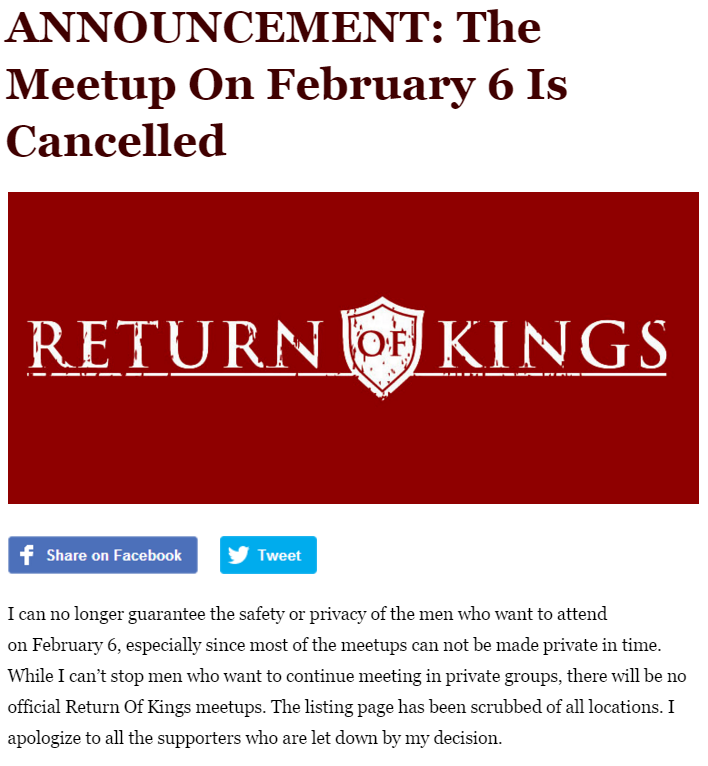The US-born writer who makes a living from hate speech is savvier than you think

They came in their combat gear: placard in one hand, umbrella in another. ‘No means no,’ they said, ‘Rape apology not welcome in Cardiff’. Two police vans parked around the corner watched over them.
It was 8 pm. The protesters were ready, all 35 of them – belonging to Cardiff Socialist Students Society. Their cause never showed up.
On the first weekend of February, the Welsh capital was supposed to be one of the 165 venues in 43 countries for the followers of one American writer to meet up over drinks. Darayus Valizadeh, better known as Roosh V, is a US-born writer now based in Poland. His scholarship includes Bang and its many variants: 30 Bang, Bang Denmark, Bang Iceland, aimed at teaching a reader the right moves to have sex with a woman.

It was in sync with the template he had set five years ago with Return of Kings, a website where one of the more polite articles is titled Behave with girls as you would with horses. The idea was to take the locker-room trash talk, turn it into a cottage industry.
On 4 January, Roosh posted about having meet-ups for his readers across the world. In the coming weeks, he rolled out the details and the list of venues.
These places weren’t your regular tourist sights. Some had a photograph of the venue with arrows pointing at a door, a statue, or a tree, where one was to wait for their kind. Where there wasn’t a photograph, was an intimate detail. The one at Manchester, for example, describes a location as the area up the stairs of a pub where you “sit down and have a smoke”.
The meeting was positioned as an exclusive club of heterosexual men. And like all cool clubs, it had a password: “Do you know where I can find a pet shop?” you ask the person waiting at the venue. If the answer was, “Yes, it’s right here,” you have found your kind.
It was a well-coordinated effort. That is perhaps what made it so real, and prompted the reaction that followed. Around this time last year, Roosh had published an article on his website proposing that rape be made legal if done on private property. Some deduced that these were gatherings of the pro-rape minds. And they spread the word.
Millions sat up, googled, read and raged.
At first, the hate and the bile made little difference. Roosh’s is a career in hate-speech. He took this online activity and turned it into a reality show. “The world is moving against us”, he wrote in a post on 3 February. There was a semblance of truth in his sweeping statement. There were debates at governmental level in United Kingdom, Australia and Canada, provoking the involvement of politicians as well as civil society.
The next day, the meet-up was cancelled. At Cardiff, as in many places, some thought it was a ruse. On that cold, wet Saturday, they made their stand known.

Two days later, Roosh called for a press conference at a hotel in Washington DC. This wasn’t his first time in front of a hostile crowd nor in front of media. Last year, in his visit to Canada, a few women greeted him by throwing beer on his face. “How dare you fucking come to Canada?” they demanded. Roosh, shielded by his bodyguard, showed them a finger and was led away.
At Washington DC, he resorted to the old trick of blaming the messenger. “Your work and the work of your own colleagues has incited a mob based on lies that has put my family in danger,” he said. “If they get hurt right now, it’s coz of you.” But try as he might, Roosh laid bare that he was trying to hide from us all this while, that he is, in fact, a closet-intellectual, possibly one of the best among us.
With our liberal values come a set of responsibilities that we exercise but don’t always acknowledge. In practice, our freedom of expression is anchored by our self-imposed restrictions. But our discourse is often full of absolutes: freedom of expression, we say, is accompanied with the freedom to offend. It’s the freedom that made Donald Trump the Presidential candidate. Like a loyal supporter that he is, Roosh takes this and uses it against the very society that made it possible.
In the press conference, there were sincere questions pertaining to his beliefs. They were an educated, refined lot who sought nuance. But the persona Roosh has crafted for himself doesn’t claim such high-ground. His discourse appeals to the baser instincts but his tactics are refined. His content might be sexist on his website but he will never respond to his haters on the comment boxes or forum. He knows it is a waste of time. There is no way he can change their minds.
Unfortunately, the literati doesn’t approach him the way they should. In one instance at the press conference, Roosh attacked the media for covering up the Cologne rape incident. In all likelihood, those present were culture critics, not migration or war correspondents. But they chose to bite.
There is a lot of coverage, a journalist countered. No there isn’t, Roosh retorts. I can send you links, the journalist replies. I will read it very carefully, Roosh says.
The next day, he uploaded a video on his website titled Roosh Destroys Media at Washington DC Press Conference.
It is why in all his years as a ‘pick-up artist’, among numerous write-ups where he told women to be submissive, the only people who won against him were the ones who threw their drinks on his face. In the liberal theology, an act of violence is scary, hence taboo. Roosh is smart enough to know what an angry mob can do. It prompted him to walk away from the irate women. It prompted him to cancel the meeting. He was, after all going to participate in at least two of them. Now, he was afraid. So he decided to draw the curtains and have the final, pathetic word.
“I’m gonna harness this,” he told the journalists. “I’m going to convert all this coverage into money and women.”
